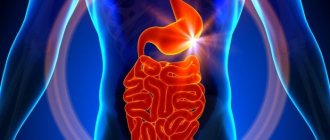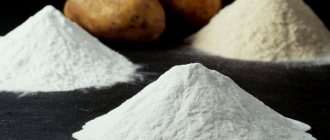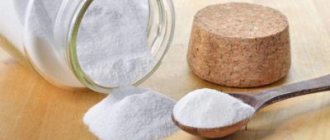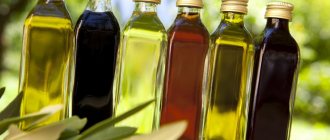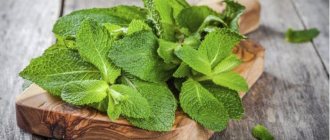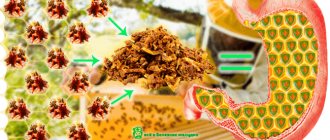In the complex treatment of inflammatory diseases of the stomach, herbal remedies are often used. They help in healing the mucous membrane, replenish the lack of essential microelements, and normalize digestion. And they cause fewer side effects than synthetic drugs. One of the most famous medicinal plants is sea buckthorn. Its rich composition and healing properties allow it to be used for a variety of diseases. It is used in the form of decoctions or juice from the fruit. But sea buckthorn oil is especially often used for gastritis. It has proven its healing effect and is even prescribed by doctors as part of complex treatment. Sea buckthorn oil is a thick, oily liquid of red-orange color with a characteristic odor.
Composition and action
Sea buckthorn has been used as a medicinal plant for several thousand years. Now its medicinal properties are recognized even by traditional medicine. Many doctors speak of sea buckthorn oil as an effective remedy against gastritis. Its popularity can be explained by its rich composition. It contains many beneficial fatty acids, for example, linoleic and linolenic acids, phytosterols, pectins, phytoncides, amino acids, and tannins. In addition, it contains more than two dozen minerals essential for health, including rare ones such as nickel, chromium, cobalt, titanium, and molybdenum.
But the main medicinal properties of sea buckthorn oil are associated with the large number of vitamins contained in its composition:
- Ascorbic acid, or vitamin C, which is abundant in sea buckthorn, is a strong antioxidant. This vitamin strengthens the walls of blood vessels and helps in the healing of the mucous membrane. In addition, ascorbic acid removes toxins, protects the mucous membrane from the negative effects of pathogenic bacteria and reduces their number.
- B vitamins provide protection and healing to the gastric mucosa. They reduce purulent inflammation and prevent atrophic processes.
- Tocopherol, or vitamin E, has wound healing properties. It helps heal the mucous membrane and protects it from further damage.
- Vitamin K normalizes blood clotting. Thanks to its presence in sea buckthorn oil, the risk of bleeding is prevented.
- Carotenoids, which are converted into vitamin A in the gastric mucosa, can increase the body's defenses. This microelement prevents the negative effects of pathogenic bacteria on the mucous membrane.
- Vitamin P is also very important for providing the healing properties of sea buckthorn oil. It has antibacterial, anti-inflammatory and analgesic properties.
Thanks to this composition and the unique combination of various healing components, sea buckthorn oil has a beneficial effect on the patient’s stomach. Its effectiveness against gastritis is explained by the fact that it has regenerating and enveloping properties. This helps protect the mucous membrane and prevents the formation of damage to it. And the stimulation of regeneration processes makes it possible to use this product even with a stomach ulcer. The healing microelements included in its composition are involved in the renewal of mucosal cells, due to which any ulcerative lesions of the stomach walls heal.
In addition, this product has, although small, pronounced anti-inflammatory and anesthetic properties. Thanks to this, the patient's condition quickly improves. And increasing local immunity ensures protection of the mucous membrane from the effects of pathogenic microorganisms.
Also, the benefit of sea buckthorn oil for gastritis is explained by the fact that it stimulates the functioning of all digestive organs. This product accelerates the production of gastric juice, has a choleretic effect, activates intestinal motility, and improves the absorption of nutrients. Thanks to this, constipation goes away, digestion improves, and unpleasant symptoms disappear, such as heaviness in the stomach and flatulence. And the property of sea buckthorn to increase the elasticity of blood vessels and normalize blood circulation helps improve tissue nutrition.
Benefit
The use of sea buckthorn oil is widely practiced in gastroenterology in the treatment of gastritis.
This product contains a lot of microelements, vitamin components, phospholipids, etc. Sea buckthorn oil has incredible benefits:
- Accelerates regeneration processes;
- Eliminates inflammatory lesions;
- Destroys bacterial microorganisms;
- Provides an enveloping effect on the gastric mucosa;
- Increased secretion of bile secretion;
- Reducing the severity of pain.
Sea buckthorn berry oil effectively heals wounds, which is why it is used in the treatment of gastritis, which allows the gastric mucosa to be restored much faster.
In addition, with the use of sea buckthorn oil, digestive processes are noticeably improved, the absorption of nutrients is enhanced and gastric functions are normalized.
Use for gastritis
Treatment of gastritis with sea buckthorn oil has been popular for a long time. It is used not only by patients who prefer natural means of therapy. Even doctors recommend that patients take this product as part of a comprehensive treatment. They prescribe the optimal course and dosage in accordance with the type of gastritis, the severity of the patient’s condition and his individual characteristics.
There are different treatment regimens for sea buckthorn oil; in addition, in some cases, its use may be contraindicated. Therefore, you should not carry out such treatment yourself, it can only worsen your health. This product, like most natural treatments, is prescribed only during remission. In case of acute inflammation, only special medications are indicated.
Sea buckthorn oil helps with any form of gastritis, but you need to drink it correctly
Sea buckthorn oil is taken for gastritis most often as part of complex therapy. It can be combined with any medications prescribed by your doctor. But taking it is recommended only during remission. This is the best remedy for preventing exacerbations. Usually take a teaspoon of oil 1-3 times a day. Be sure to eat after this, as sea buckthorn stimulates the production of gastric juice and bile. The course of treatment with this remedy is 1–2 months, then you need to take a break.
At first, taking the oil can lead to heartburn and exacerbation of the disease. Some patients complain of bitterness in the mouth. In addition, nausea often occurs; not everyone can swallow a whole spoonful of oil. In this case, it can be mixed with 50 ml of water. It is allowed to sweeten it a little, preferably with honey. Sometimes, in case of high acidity, it is recommended to mix the oil with milk or drink it with mineral water. And to relieve pain in the stomach, take it one tablespoon at a time and eat it with a piece of black bread.
With increased acidity
Despite the fact that sea buckthorn oil stimulates secretion and increases the production of gastric juice, it is often used for gastritis with high acidity. After all, this product has one more important property: it envelops the mucous membrane, especially its damaged areas, and protects it from the effects of hydrochloric acid. Therefore, in this form, sea buckthorn is even beneficial for the stomach.
If you have a similar problem, it is recommended to drink sea buckthorn oil half an hour before meals. So it will not only protect the mucous membrane from irritation and damage, but also normalize the digestion process.
With low acidity
But most often it is recommended to take sea buckthorn oil for gastritis with low acidity. After all, the main property of this product is that it stimulates secretion. At the same time, the production of hydrochloric acid and bile increases, which improves the digestion process.
With atrophic
Atrophic gastritis is dangerous because it leads to dangerous complications, but is often almost asymptomatic. The disease is characterized by thinning of the mucous membrane and impaired production of gastric juice. Its treatment must be carried out under the supervision of a doctor. And taking sea buckthorn oil is allowed only as part of complex therapy.
This remedy helps restore the mucous membrane, reduces acidity and alleviates the patient's condition. To do this, take the oil according to a special scheme: dissolve 2-3 teaspoons in a glass of warm milk. The resulting drink should be drunk daily in the morning on an empty stomach.
For erosive
If you have erosive gastritis, you can also take sea buckthorn oil. In this case, it will help prevent the formation of new erosions and ulcers. In addition, this remedy will speed up healing and reduce pain. In order for it to have this effect, it must be taken before meals, about 1 hour before.
Capsules with sea buckthorn oil
Sea buckthorn oil can be purchased at a pharmacy. It is available in liquid form and capsules. One capsule contains 200 or 300 mg of oil, there are 100 pieces in a package. The instructions for use contain the following indications:
- Radiation injuries.
- Stomach or duodenal ulcer.
- Gastritis with high acidity.
- Recovery after operations on the gastrointestinal tract (gastrointestinal tract).
- Chronic inflammation of the large intestine.
- Nonspecific ulcerative colitis.
You need to take capsules 2-3 times a day, 1.6 ml of oil at a time (this is 8 capsules or 5 ml). Duration of therapy is 10–14 days. If sea buckthorn oil is drunk for preventive purposes, then you need to take 0.8 g of the product once a day.
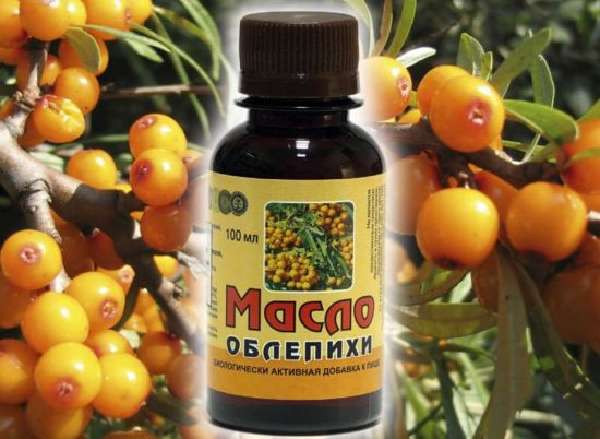
When used, side effects may occur, such as bitterness in the mouth, allergic reactions, diarrhea
Sea buckthorn oil in capsules has a number of advantages:
- Nutrients last longer because they do not oxidize.
- The substances have greater bioavailability.
- The drug in capsules does not have a pronounced odor or aroma.
- Ease of storage, use and dosing.
Contraindications and side effects
Not all patients with a sick stomach can be treated with sea buckthorn oil. This is a natural product, so although rare, there are cases of individual intolerance. However, taking sea buckthorn in any form can lead to serious allergic reactions. And exceeding the dosage sometimes causes diarrhea, vomiting, and headaches.
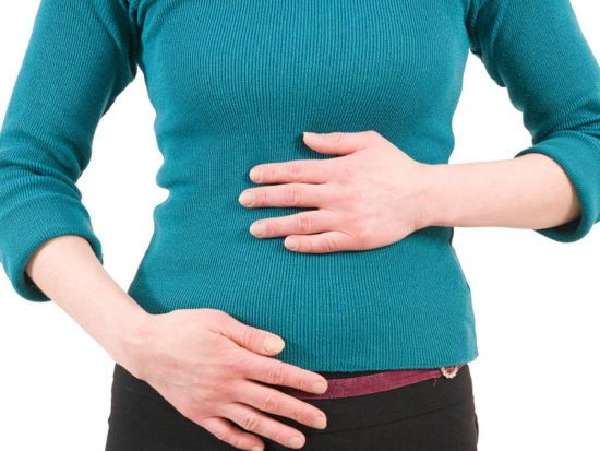
Sea buckthorn oil can be taken only during remission and for those people who do not have allergic reactions to it.
In addition, contraindications for such treatment include cases of exacerbation of diseases of the gastrointestinal tract. It is especially harmful to take this remedy if you have gallstones or mechanical obstruction of the bile ducts, since it has a choleretic effect. It is also undesirable to treat gastritis in this way for people with a tendency to diarrhea, impaired liver function, or pancreatitis. Sea buckthorn oil is not prescribed to children under 12 years of age due to the imperfection of the digestive system and the risk of allergic reactions.
How do you take the medicine for prevention?
Sea buckthorn oil is an excellent means of preventing not only inflammation of the stomach, but also other diseases of the gastrointestinal tract. The medicine also significantly prolongs the period of remission in chronic gastritis, performing a kind of prevention of exacerbations. It is better to find out the dosage from your doctor.
Doctors usually recommend taking a spoonful of oil for three weeks after waking up. You can add it to salad. This will not make the effect worse. A good option is to drink juice. Here the duration of treatment is 10 days.
Taking sea buckthorn oil is a popular method of treating gastritis at home. Its use should be carried out after examination and consultation with a specialist so that negative manifestations do not develop. If they occur, therapy with the drug is immediately stopped. In general, folk medicine is effective for inflammation of the stomach and other organs of the digestive system. But it cannot replace drug treatment.
We recommend: Dietary rules for gastritis during exacerbation
Preparation of oil
The easiest way to treat is oil, which is sold in pharmacies. It is produced in dark glass bottles or capsules. This product is available to everyone and is inexpensive - from 40 to 200 rubles, depending on the form of release and dosage.
Treatment of gastritis with honey
But you can also prepare sea buckthorn oil yourself. This is especially true for those who have this plant growing in their country house. Sea buckthorn needs to be washed, dried and passed through a juicer. Then the cake is laid out to dry. The raw materials should lie in a dry place for some time, but not in direct sunlight. After this, the cake must be squeezed out to obtain healing oil. You can also grind the berries in a blender and leave them in a wide-necked container. Oil will gradually appear on the surface, which is collected with a spoon, a small syringe or a syringe without a needle.
Another way to prepare the medicine is simpler. But since vegetable oil is used for this, the resulting product will not be as valuable. Its use will be effective in preventing exacerbations. This oil is obtained by mixing crushed sea buckthorn fruits with olive or other odorless vegetable oil in a 1:1 ratio. Moreover, it should cover the berries by at least 3 cm. Keep the container with this mixture for a week in a dark place, stirring occasionally. After straining, the product should be stored in the refrigerator.
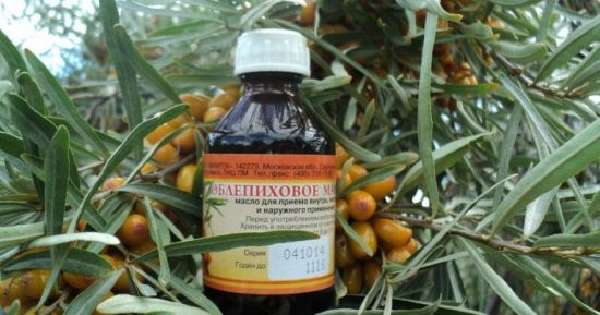
You can buy oil at the pharmacy or prepare it yourself from sea buckthorn berries
Sea buckthorn oil for high stomach acidity
There are certain rules for people with high stomach acidity that apply specifically to this product. Sea buckthorn oil will help reduce acidity levels and can effectively protect the gastric mucosa from negative effects and damage of various kinds. Its regular use will prevent the development of ulcers, and this is very important.
It is worth remembering that people with high stomach acidity may experience heartburn after consuming sea buckthorn oil. In order not to treat it later, you need to take the product correctly and carefully. Doctors recommend making a simple mixture consisting of 50 g of sea buckthorn oil and a glass of warm, boiled water. You should also add 3 tsp to the glass. soda, mix everything well, leave to steep for 1 hour, shaking constantly, after an hour the oil will be at the top of the glass, and it can be consumed without harm to your well-being. You can also simply drink the product with mineral water at room temperature, so the effect will be better and even people with high acidity will not need to worry about unpleasant heartburn.
Reviews
Sea buckthorn is a plant loved by many. Even if these berries do not grow on an individual plot, many people buy them or medicines containing them. Sea buckthorn oil is especially popular. Some people have it at home all the time. And patients with gastritis often only use it to prevent frequent exacerbations. Numerous reviews speak about this.
Anastasia I have known about sea buckthorn oil for a long time. Even as a child, my grandmother lubricated all the scratches and abrasions with this product - they healed very quickly. And recently I learned that it can be used to treat gastritis. This disease torments my eighteen year old daughter. Therefore, during the next remission, I began to give her a teaspoon of oil half an hour before breakfast and dinner. She was treated like this for a month, she says that her digestion has improved, and there have been no exacerbations for six months.
Tatyana I have suffered from gastritis since childhood. I took a lot of medicine. During an exacerbation, they help, but during remission I try not to drink anything. But after exacerbations began to happen more often recently, I began to look for ways to prevent them. The doctor advised drinking sea buckthorn oil, a teaspoon diluted in half a glass of water, as a preventative measure. The drink turned out very nasty and made me feel sick. In addition, heartburn worsened. Therefore, after three days I stopped this treatment.
Svetlana I was diagnosed with atrophic gastritis, although I felt almost no discomfort. The doctor prescribed a bunch of medications and recommended drinking warm milk with two tablespoons of sea buckthorn oil dissolved in it in the morning. I don’t know what helped, but a month later an examination showed a significant improvement in my condition.
How do berries and sea buckthorn juice affect the stomach?
When answering the question whether sea buckthorn is allowed for gastritis of the stomach, gastroenterologists always give a positive answer.
With reasonable and moderate consumption, berries are not only recommended, but extremely necessary. True, the juice of the plant is considered the most useful. And now you will understand why this is so.
Fresh juice has a powerful anti-inflammatory and regenerating effect. And sitosterol, which is part of the berries, prevents the deposition of cholesterol plaques in blood vessels and helps remove toxins that have accumulated in the body over many years of unhealthy eating.
Sea buckthorn juice and sea buckthorn berries for gastritis have the most positive effect on a sore stomach. They activate the regeneration process of the mucosa and contribute to its rapid recovery.
Effective treatment of gastritis and cholecystitis with diet
Have you been struggling with GASTRITIS and ULCERS for many years without success?
Head of the Institute: “You will be amazed at how easy it is to cure gastritis and ulcers simply by taking it every day.
Many people who have never experienced gastritis and cholecystitis are mistaken that these diseases are harmless. In fact, when these diseases are diagnosed, the patient requires long-term serious treatment. Very often, with an advanced form, even more serious diseases develop, including cancer.
Our readers successfully use Monastic Tea to treat gastritis and ulcers. Seeing how popular this product is, we decided to bring it to your attention. Read more here...

When treating gastritis and cholecystitis, it is important to follow a properly formulated diet.
Gastritis is not only an inflammation of the gastric mucosa, but also its depletion. The disease develops if you eat poorly, abuse alcohol, smoke, and also after food poisoning or the bacteria Helicobacter pylori entering the body. With cholecystitis, there is a rapid development of the disease, which also appears due to ignoring proper nutrition, during frequent constipation, and overeating.
For cholecystitis and gastritis, it is necessary to adhere to complex therapy, which is drawn up by the doctor after diagnosis and confirmation of the diagnosis. If you don't follow the dietary rules, all your efforts will be in vain. In this case, the disease begins to progress, the symptoms become more pronounced, so the patient’s condition will only worsen.
Diet food
A diet for gastritis and cholecystitis allows you to “unload” the affected organs, helps wounds heal faster, and normalizes the functions of the stomach and gall bladder. If these diseases occur chronically, the patient needs to create a special menu that he will adhere to throughout his life. Otherwise, the disease will worsen and lead to complications. It should be noted that the diet for gastritis and pancreatitis, cholecystitis is not too different.

There are general rules that apply to these diseases:
- you need to eat in small portions;
- eat up to five times a day;
- strictly adhere to one time for eating, this is necessary for the formation of constant acid secretion in the stomach and the outflow of bile;
- the first breakfast, lunch, and dinner should be denser, and the second breakfast and afternoon snack should be light;
- last meal three hours before bedtime;
- food should be steamed; stewed, baked or boiled dishes are also suitable;
- meat and vegetables must be consumed pureed;
- drink about two liters of water.
Nutritional Features
For pancreatitis and gastritis, as well as cholecystitis, it is necessary to follow diet No. 5. Based on it, the patient’s menu should include proteins, carbohydrates, food with sufficient fiber and pectin. Such a diet limits the entry of cholesterol and oxalic acid into the body.
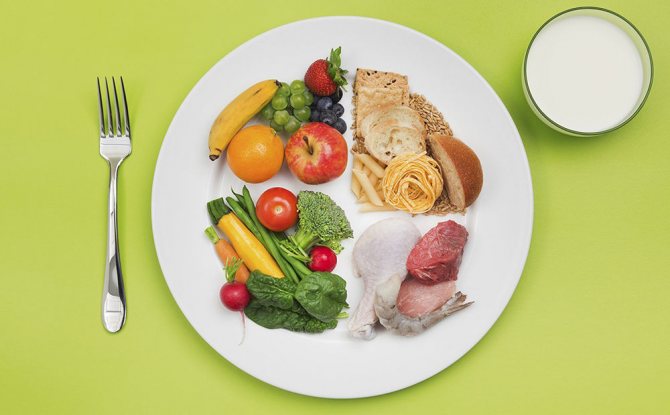
By diet we mean:
- consumption of about 80 grams of protein, of which 60% is of animal origin;
- adding about 400 grams of carbohydrates to the diet, 90 grams of sugar;
- the daily menu should contain 75 grams of fat, 25% of which are vegetable;
- use no more than 10 grams of salt.
As for the daily energy value, it should not exceed 2400 kcal. The attending physician determines the duration of this special diet.
It should be noted that in case of exacerbation of illnesses, experts advise to refrain from eating for a couple of days. At this time, it is better to give preference to strong or green tea, rosehip decoction, and mineral water without gases.
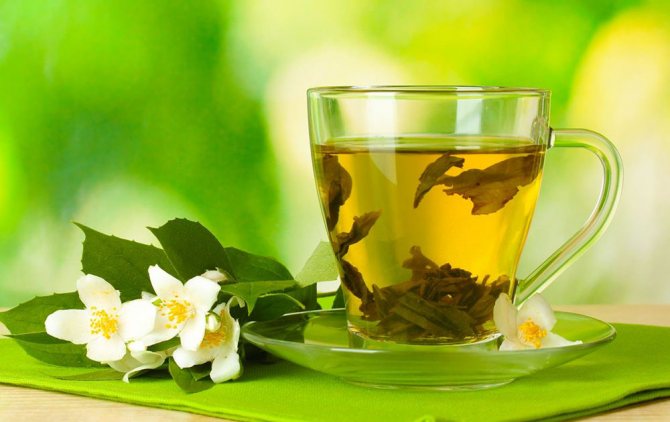
Food in the diet
Despite the similarity of nutrition, it is worth noting that the diet for pancreatitis and cholecystitis is strict, it contains a minimal amount of fat, and for gastritis these restrictions are less stringent. Permitted products include:
- bread that was baked from 1st, 2nd grade flour;
- vegetable, dairy, cereal soups;
- for gastritis, you can also add fish and meat soups to your diet;
- lean meat, lean fish;
- dairy products, provided their fat content is less than 3.2%, unsalted cheeses;
- steam omelet, soft-boiled eggs;
- well-cooked pasta;
- non-acidic vegetables and fruits, dried fruits, honey;
- milk and tomato sauces, but not store-bought ones;
- compote, fruit drink;
- vegetable oil, butter.
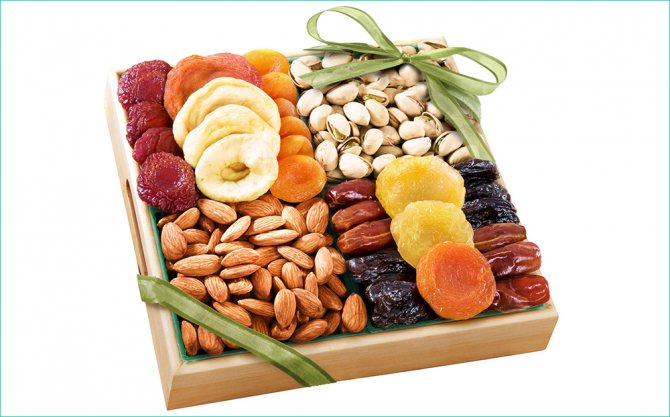
The patient should exclude the following foods from his daily diet:
- fresh bread, pastries;
- smoked meats, canned food;
- cream, sour cream;
- legumes;
- spicy vegetables (for example, garlic, sorrel, radish, radish). For gastritis, this list is replenished with fresh apples and onions;
- chocolate, ice cream;
- spices;
- lard, margarine.
Many patients wonder what to eat if they have gastritis and pancreatitis, as well as cholecystitis. In fact, as can be seen from the above list, there are many permitted foods, so following a diet is not so difficult.
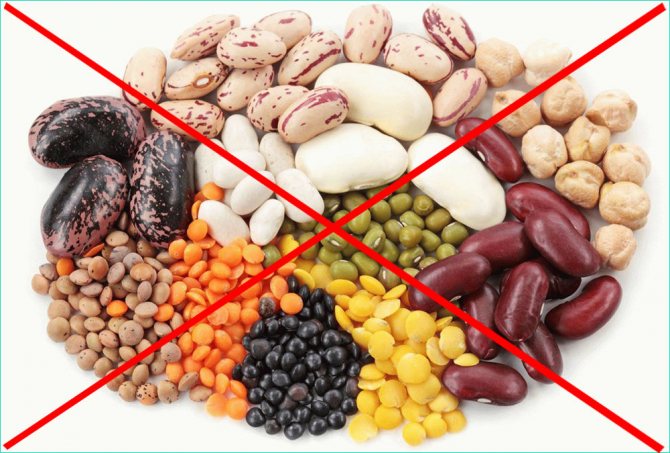
Sample menu
The patient can start his day with a bowl of oatmeal cooked with milk, add one soft-boiled egg to breakfast, and then enjoy tea. The next meal may include cottage cheese seasoned with sour cream and yogurt. For lunch you can have soup made from pasta, vegetables and sour cream, stew cutlets and cook potatoes, and drink compote after eating. Since the afternoon snack should be light, the patient is recommended to drink jelly or eat two uneaten cookies. For dinner we will prepare rice casserole with dried fruits, fish and kefir.
It is important to understand that in order to cure these diseases, you need to normalize your diet and review your lifestyle, avoid stress and overwork, get rid of bad habits, and get enough sleep. Only following these simple rules will allow you to be healthy.
special instructions
Sea buckthorn is quite mildly tolerated by the body and can be used by almost everyone. But there are a number of conditions in which the use of this product is prohibited or very limited.
These include diseases
- cholecystitis;
- liver diseases;
- pancreatitis;
- allergy to sea buckthorn and individual intolerance;
- pregnancy;
- childhood.
Despite the relative safety of sea buckthorn oil, it is recommended that before taking it for a course, consult a doctor about the appropriateness of use and safety.
